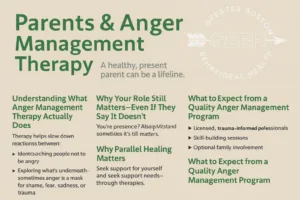When your child is struggling with anger—especially when that anger turns into outbursts, broken trust, or fear—it can leave you standing at the edge of something you don’t recognize anymore. You may feel like you’re losing them to something bigger than a bad mood. Something that’s hurting them, and maybe even scaring you.
At Greater Boston Behavioral Health, we want you to know this: You didn’t cause this alone. You’re not supposed to fix it alone. But your presence? It still matters. Even if your child is 19. Even if they roll their eyes. Even if things feel tense and distant.
Anger management therapy offers tools to help your young adult gain insight, learn to regulate emotions, and build safer ways to express themselves. And when parents stay involved in healthy, respectful ways, the healing goes deeper—for everyone.
Let’s talk about what that involvement really looks like.
Understanding What Anger Management Therapy Actually Does
First, let’s clear something up: anger management therapy isn’t about “teaching people not to be angry.” Anger is a valid emotion. It’s a signal that something feels off, unsafe, or unjust. What therapy does is help the person slow down between that signal and their reaction.
That’s especially important for teens and young adults whose brains are still developing—especially the areas involved in impulse control and emotional regulation.
Therapy might include:
- Identifying triggers—what sets off the anger
- Exploring what’s underneath—sometimes anger is a mask for shame, fear, sadness, or trauma
- Learning and practicing regulation tools—like breathwork, CBT, or DBT techniques
- Rebuilding relationships through more effective communication
In short: anger management therapy helps your child gain space between what they feel and how they act. That space is where growth happens.
Why Your Role Still Matters—Even If They Say It Doesn’t
As kids become adults, the parenting role shifts. You’re not dictating curfews or checking their backpack anymore. But that doesn’t mean you’re irrelevant.
Far from it.
Young adults still crave safety—even when they can’t name it. Your calm, consistent presence sends a powerful message: “Even when you’re struggling, I’m not going anywhere.”
They might not thank you for showing up. They might push back or shut down. But don’t confuse that with disinterest. They’re testing the edges of your reliability—sometimes because it’s the only safe thing they know to do.
Think of yourself as emotional scaffolding: not the builder, not the therapist, but the steady framework they lean against while they figure things out.
What Parents Can Do to Help Without Taking Over
We know you want to help. But sometimes, the urge to fix or manage actually increases tension. So let’s talk about what helpful involvement looks like:
1. Stay Curious, Not Controlling
Try shifting from “Did you go to therapy?” to “How are you feeling about therapy lately?”
This leaves the door open without demanding performance.
2. Set Boundaries Without Withdrawing Love
Boundaries keep everyone safe. For example:
“I care about you, and I can’t stay on the phone if the conversation turns aggressive. Let’s talk when things are calmer.”
It’s not about punishment—it’s about protecting the connection, not just the conversation.
3. Regulate Your Own Reactions
One dysregulated parent can trigger an entire blow-up. Your own calm is a lighthouse.
If you’re struggling with your reactions, that’s okay. You deserve support too (more on that below).
4. Ask What They Need—Then Actually Listen
Sometimes your child needs space. Sometimes they need you nearby. Asking “What’s most helpful from me right now?” opens a path for trust.
If they say “nothing,” that’s okay. Respect their boundary—but keep showing up in small, consistent ways.
Why Parallel Healing Matters
Your child may be the one in therapy—but that doesn’t mean you’re outside the healing process. In fact, many parents find that their own stress, guilt, or unhealed wounds come to the surface during this time.
And that’s not a failure. That’s an opportunity.
Consider these paths:
- Parent support groups where you can talk with others navigating similar challenges
- Family therapy sessions integrated into your child’s program
- Individual therapy for yourself to process grief, guilt, fear, or burnout
Seeking your own support doesn’t mean you did something wrong. It means you’re choosing to show up with greater presence, clarity, and compassion. That’s not weakness—that’s leadership.
What to Expect from a Quality Anger Management Program
Not all anger management programs are the same. At Greater Boston Behavioral Health, we tailor care plans based on the person—not a one-size-fits-all checklist.
Most young adults in our anger management therapy track will receive:
- Individual therapy with licensed professionals trained in emotional regulation and trauma-informed care
- Skill-building sessions using evidence-based models like CBT and DBT
- Optional family involvement when appropriate and with the client’s consent
- Case management and coordination for complex needs
If you’re looking for anger management therapy in Dedham, MA or nearby, we can help guide your family toward the right care path—without judgment or pressure.
Let Go of the “Perfect Parent” Trap
One of the most common pain points we hear from parents is this:
“I feel like I failed them.”
Please hear this: Your child’s anger is not proof of your failure. It is a signal that something needs attention. And the fact that you’re here, reading this, looking for ways to show up differently—that’s love in action.
You don’t need to have all the answers. You just need to be willing to learn, stay in the room, and keep loving them through the storm.
Anger Can Be a Doorway
It’s hard to see it in the moment, but anger often opens the door to deeper healing.
Anger says: “Something is not okay.” Therapy helps name that “something,” understand it, and choose new responses. With your support—calm, clear, and grounded—that doorway can stay open long enough for something better to emerge.
Healing may not be fast. It may not look like you hoped. But it is possible.
And it’s often more possible when parents are quietly, steadily involved.
FAQs About Anger Management Therapy for Young Adults
How long does anger management therapy take to work?
It varies. Some young adults begin noticing improvements in 6–8 weeks, while others may need longer-term support, especially if underlying trauma or mental health conditions are present.
Does my child need to be diagnosed with something to get anger management therapy?
No. A formal diagnosis is not required to begin therapy focused on emotional regulation. However, part of the intake process may explore whether co-occurring conditions like anxiety or depression are contributing to anger.
What if my child refuses to go to therapy?
You can’t force them—but you can stay connected, express concern, and offer resources. Often, having a non-judgmental conversation about what’s making therapy feel unappealing can open up a path forward.
Can I be involved without attending their sessions?
Yes. Many programs offer family check-ins, collateral support, or psychoeducation for parents. You don’t need to be in the room to be part of the healing.
Do you offer anger management therapy in specific areas around Boston?
Yes—we serve clients throughout the region, including those looking for anger management therapy in Boston, MA and nearby towns like Dedham and Needham. Telehealth options may also be available.
Ready to talk?
Call (888) 450-3097 to learn more about our anger management therapy services in Boston, Massachusetts. We’re here to support you, your child, and your family—without shame or blame.


